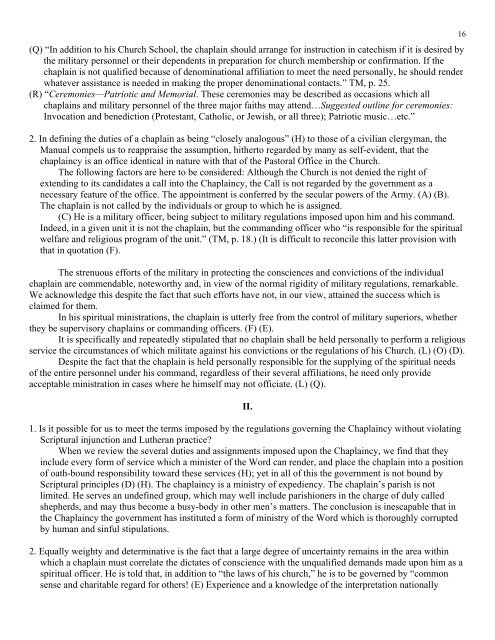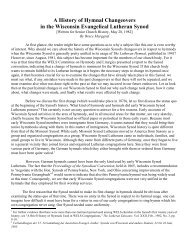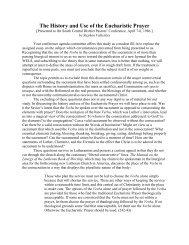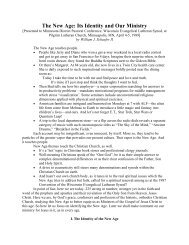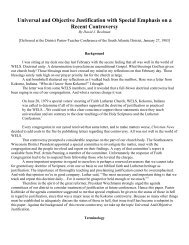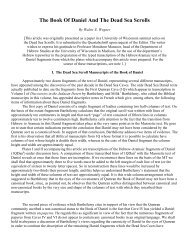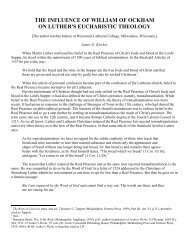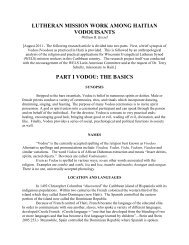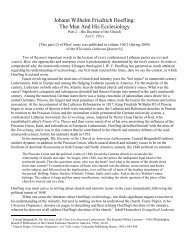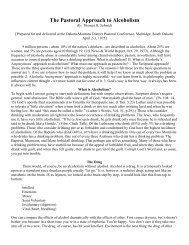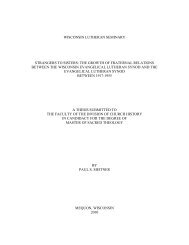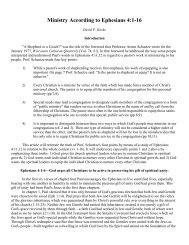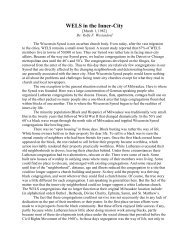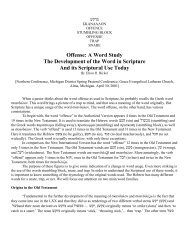A History of WELS Special Ministries - Wisconsin Lutheran Seminary ...
A History of WELS Special Ministries - Wisconsin Lutheran Seminary ...
A History of WELS Special Ministries - Wisconsin Lutheran Seminary ...
You also want an ePaper? Increase the reach of your titles
YUMPU automatically turns print PDFs into web optimized ePapers that Google loves.
(Q) “In addition to his Church School, the chaplain should arrange for instruction in catechism if it is desired by<br />
the military personnel or their dependents in preparation for church membership or confirmation. If the<br />
chaplain is not qualified because <strong>of</strong> denominational affiliation to meet the need personally, he should render<br />
whatever assistance is needed in making the proper denominational contacts.” TM, p. 25.<br />
(R) “Ceremonies—Patriotic and Memorial. These ceremonies may be described as occasions which all<br />
chaplains and military personnel <strong>of</strong> the three major faiths may attend…Suggested outline for ceremonies:<br />
Invocation and benediction (Protestant, Catholic, or Jewish, or all three); Patriotic music…etc.”<br />
2. In defining the duties <strong>of</strong> a chaplain as being “closely analogous” (H) to those <strong>of</strong> a civilian clergyman, the<br />
Manual compels us to reappraise the assumption, hitherto regarded by many as self-evident, that the<br />
chaplaincy is an <strong>of</strong>fice identical in nature with that <strong>of</strong> the Pastoral Office in the Church.<br />
The following factors are here to be considered: Although the Church is not denied the right <strong>of</strong><br />
extending to its candidates a call into the Chaplaincy, the Call is not regarded by the government as a<br />
necessary feature <strong>of</strong> the <strong>of</strong>fice. The appointment is conferred by the secular powers <strong>of</strong> the Army. (A) (B).<br />
The chaplain is not called by the individuals or group to which he is assigned.<br />
(C) He is a military <strong>of</strong>ficer, being subject to military regulations imposed upon him and his command.<br />
Indeed, in a given unit it is not the chaplain, but the commanding <strong>of</strong>ficer who “is responsible for the spiritual<br />
welfare and religious program <strong>of</strong> the unit.” (TM, p. 18.) (It is difficult to reconcile this latter provision with<br />
that in quotation (F).<br />
The strenuous efforts <strong>of</strong> the military in protecting the consciences and convictions <strong>of</strong> the individual<br />
chaplain are commendable, noteworthy and, in view <strong>of</strong> the normal rigidity <strong>of</strong> military regulations, remarkable.<br />
We acknowledge this despite the fact that such efforts have not, in our view, attained the success which is<br />
claimed for them.<br />
In his spiritual ministrations, the chaplain is utterly free from the control <strong>of</strong> military superiors, whether<br />
they be supervisory chaplains or commanding <strong>of</strong>ficers. (F) (E).<br />
It is specifically and repeatedly stipulated that no chaplain shall be held personally to perform a religious<br />
service the circumstances <strong>of</strong> which militate against his convictions or the regulations <strong>of</strong> his Church. (L) (O) (D).<br />
Despite the fact that the chaplain is held personally responsible for the supplying <strong>of</strong> the spiritual needs<br />
<strong>of</strong> the entire personnel under his command, regardless <strong>of</strong> their several affiliations, he need only provide<br />
acceptable ministration in cases where he himself may not <strong>of</strong>ficiate. (L) (Q).<br />
II.<br />
1. Is it possible for us to meet the terms imposed by the regulations governing the Chaplaincy without violating<br />
Scriptural injunction and <strong>Lutheran</strong> practice?<br />
When we review the several duties and assignments imposed upon the Chaplaincy, we find that they<br />
include every form <strong>of</strong> service which a minister <strong>of</strong> the Word can render, and place the chaplain into a position<br />
<strong>of</strong> oath-bound responsibility toward these services (H); yet in all <strong>of</strong> this the government is not bound by<br />
Scriptural principles (D) (H). The chaplaincy is a ministry <strong>of</strong> expediency. The chaplain’s parish is not<br />
limited. He serves an undefined group, which may well include parishioners in the charge <strong>of</strong> duly called<br />
shepherds, and may thus become a busy-body in other men’s matters. The conclusion is inescapable that in<br />
the Chaplaincy the government has instituted a form <strong>of</strong> ministry <strong>of</strong> the Word which is thoroughly corrupted<br />
by human and sinful stipulations.<br />
2. Equally weighty and determinative is the fact that a large degree <strong>of</strong> uncertainty remains in the area within<br />
which a chaplain must correlate the dictates <strong>of</strong> conscience with the unqualified demands made upon him as a<br />
spiritual <strong>of</strong>ficer. He is told that, in addition to “the laws <strong>of</strong> his church,” he is to be governed by “common<br />
sense and charitable regard for others! (E) Experience and a knowledge <strong>of</strong> the interpretation nationally<br />
16


